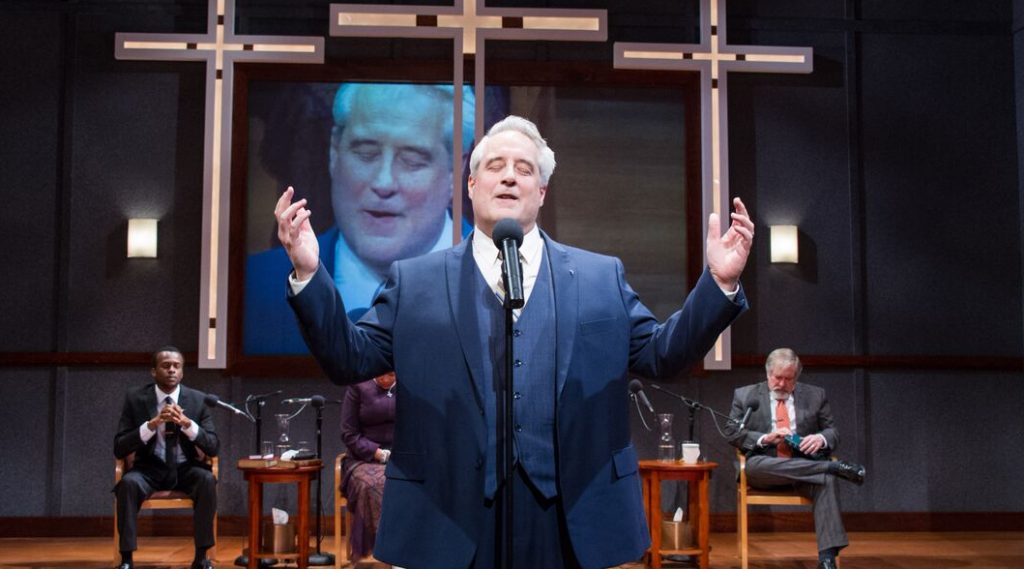Last Chance: “The Christians” at Theater J
By • December 7, 2016 0 921

When Pastor Paul, the leader of a large and successful Christian congregation, walks onto the stage to deliver a sermon, he looks like a man at one with his world. Backed by large crosses and a big video screen, basking in the sounds of a gospel choir, flanked by his assistant pastor, his wife and a community church elder, he stands, smiling.
And after he details the rise of his church from a corner congregation to almost megachurch status, and announces that the church has made good on all of its debts, that’s about as good as it’s going to get for Pastor Paul, the people he knows and loves and the church itself.
Because Pastor Paul has something new to say. He has had a vision, in a conversation with God, after hearing a troubling story about a heroic young boy who died saving others in a fire. By the practices and rules of Pastor Paul’s faith, this boy cannot enter heaven, but is condemned to hell because he is of another faith.
Pastor Paul has come on this day to deliver some startling news to his congregation, a pronouncement that goes dramatically against the core beliefs of his church and his faith. Thereafter, things go south for him and his church, but they get very interesting for the audience during the course of Theater J’s production of Lucas Hnath’s “The Christians,” which ends this weekend.
That this play, imaginatively staged, should be presented at Theater J, which is part of the D.C. Jewish Community Center, is novel in and of itself, because it stirs all sort of theological debates about the nature of God, heaven and earth and what it means to be a Christian and a believer. It seems especially poignant and important in these our times, when religion has come to play a major role in our political life.
Pastor Paul has offered a radically new vision of hell, questioning if it exists at all. From this assertion flow complicated and painful ideas about not just hell, but an open-gated heaven from which none are excluded. It becomes quite clear that Pastor Paul — while he has studied the biblical issues and citations to back his claim — has underestimated the reaction to it.
In short order, the church begins to crumble. Associate Pastor Joshua, who strongly disagrees with Pastor Paul, splits from the congregation, and quite a few members leave with him. Pastor Paul’s wife begins to question her own beliefs and those of her husband. So does Elder Jay, a board member of the church. And the most vehement questions and the most hurtful outbursts come from a member of the congregation named Jenny, played with intense anguish by Annie Greer — a struggling single mother whose rock-bed belief in her faith and church, now shaken by the pastor, has sustained her.
These are the kinds of questions and issues that trouble almost every one of us, whether skeptics, passionate believers or occupants of other spots on the spirituality spectrum. In Pastor Paul, Hnath, a gifted new playwright, has created a man comfortable in his suit and vest, and in the notion of achieving the right to be skeptical of core beliefs. However, he is unwilling, initially, to accept responsibility for the results of his actions.
Director Gregg Henry and his team of designers have created both an intimate space and the illusion of size; the videos bring his characters closer to us as they talk and react, the crosses are large and bright. And then there’s the choir. Theater J has managed to bring Washington-area gospel choirs to the productions, different ones for every performance. Georgetown’s Mt. Zion Methodist Church choir and the Mt. Moriah Baptist Church choir participated on the night I attended.
The atmospherics contribute to the feeling, as do the actors, who all but inhabit the characters that Hnath has created. There is a certain equanimity in the individuals peopling the stage. They could have easily, at turns, fallen into caricature, but they remain solidly human and as recognizable as faces in the mirror.
As Pastor Paul, Michael Russotto — who was last seen in Olney’s production of “The Diary of Anne Frank” — has a charismatic charm almost throughout, even as the extent of the catastrophic effects pile up. He loves his wife, the strong but stoic Elizabeth — played with calm vulnerability by Caroline Stefanie Clay — but, as with his assistant pastor, he has neglected to discern her feelings, the strength and depth of the pain he has caused.
That becomes most clear in his dealing with Joshua, for whom the pastor’s revelation is shocking and shattering. In a sorrowful and moving scene, the two men of faith attempt to reconcile their love and respect for each other with the religious schism that has separated them. Justin Weaks as Joshua is a stirring presence, who has his own crisis to share.
During the Christmas season, when religion rarely makes an appearance on the stage, it is refreshing to see in such an ecumenical atmosphere a challenging, questioning and powerfully staged and performed play.

